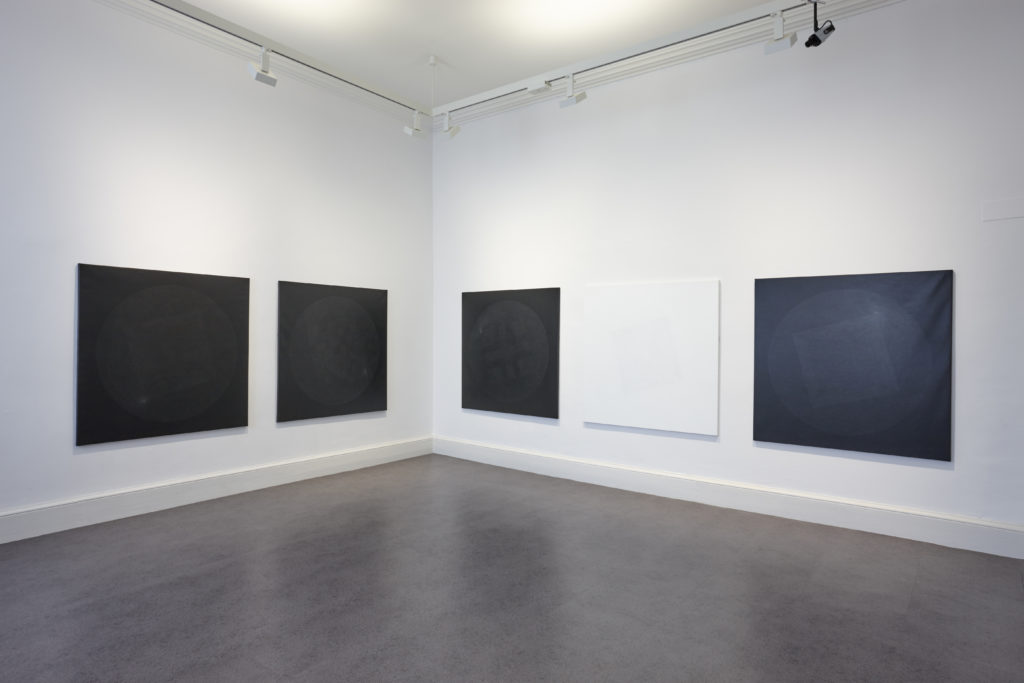Resonance, 1994
The idea that behind the outward appearance of things lies an inner reality which can be expressed in an abstract language is central to Shirazeh Houshiary’s artistic practice. Houshiary works with a series of forms which are determined by logical rules and the numerical and geometrical symbolism drawn from Sufi cosmology. Houshiary’s world view is deeply informed by Sufism, the esoteric and mystical tradition of the Islamic faith. In existence since the beginning of the eighth century, Sufism seeks the inner way or spiritual path to mystical union with God. Houshiary does not celebrate national or individual identity in her art, rather she seeks to employ forms and symbols that are universal. The artist also sees such symbolism in the other traditions such as those of Ancient Greece, Judaism and Christianity. “In my work there is a continual invention of already existing forms and symbols precisely because the problem is not to be original, nor indeed to establish a distinction between forms of knowledge or between East and West.”* The use of intricate pattern, geometry and calligraphy in Islamic sacred art, which are symbolic of religious doctrines and universal laws, also reflects the aniconic nature of Islamic art tradition where the depiction of God or the Divine in a concrete image is forbidden. The complex patterning of Islamic decoration symbolises the Sufi goal of gathering all multiplicity into unity, the integration of all aspects of the self into a centre, which is Divine. One basis of Islamic art is the belief that the Divine One is a unity but that his Divinity is manifest in the universe through multiplicity. This duality of Oneness and Multiplicity as well as the unity of light and dark can be seen in both Houshiary’s paintings and sculptures. ‘Resonance’ consists of five square canvases each the same size. Four are flat black grounds and one is white. Using graphite each is inscribed with dense minute Arabic script. Arabic words are painstakingly inscribed onto each canvas, repeated many times, spinning out into geometric shapes and woven so closely together that it becomes illegible. Houshiary notes that “what the word says is irrelevant. Somebody who understood the language could not read it any more due to the intensity of writing, and somehow the word loses its meaning , which creates another meaning, which is the form, which is the activity.” The poetry of the thirteenth century Sufi mystic Jalal-Din Rumi has inspired Houshiary and often provides the starting point for her work such as ‘Resonance’. In common with Rumi’s poems, the activity of making the paintings is akin to a chant. “Rumi wrote thousands and thousands of couplets all about One, its like a chant.” So for me that is where the relationship comes”, says Houshiary. I’m creating forms too, but he does it with words, but we are both praising life . The activity of the paintings is about now – capturing the moment… Because it is incredibly physical to realise these paintings, it is like a kind of dance. I have to turn inside the painting itself to create these works and this act of turning and movement happens in the body itself …my activities have become more involved with music and dance …and my involvement with poetry has made me conscious that words are sound and form.” *Shirazeh Houshiary in interview with Stella Santacatterina. Third Text No.27 1994
| Medium | Graphite and acrylic on canvas |
| Dimensions | Unframed, 134 x 134 cm |
| Credit Line | IMMA Collection: Loan, Weltkunst Foundation, 1996 |
| Item Number | L.648 LW |
| On view | Art as Agency, IMMA Collection: 2025-2028, 08/02/2025 - 07/01/2027 |
| Copyright |
© the artist Denis Mortell Photography For copyright information, please contact the IMMA Collections team: [email protected]. |
| Tags |
